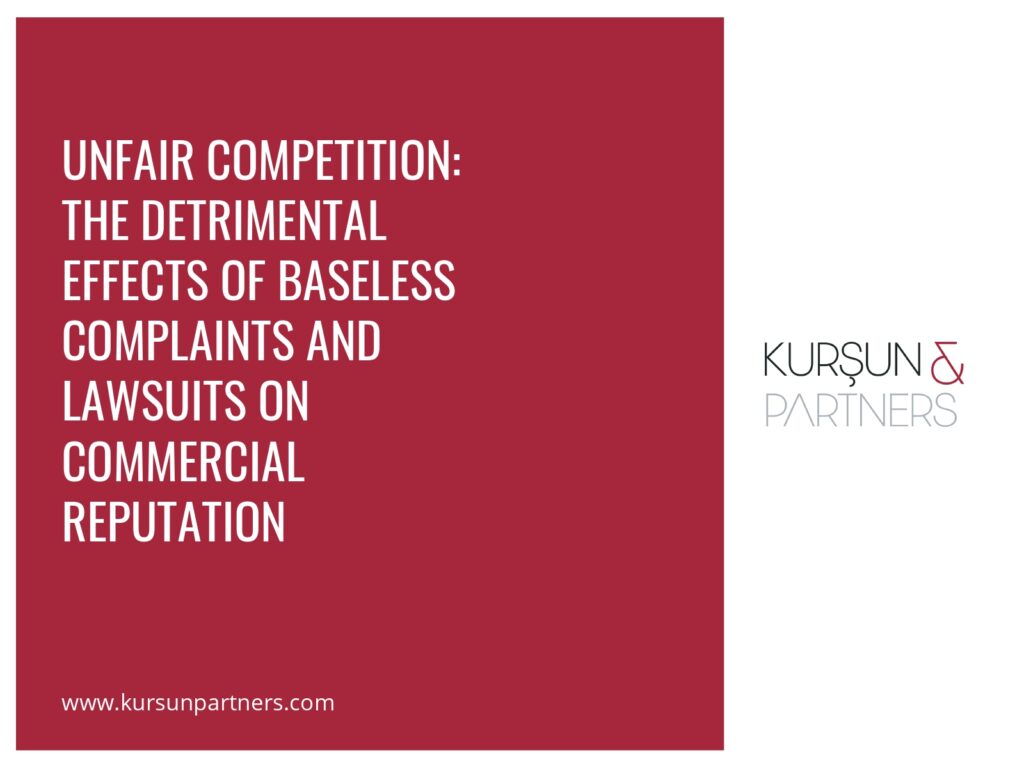
Legal disputes between rival companies are a common occurrence in the highly competitive market. The strategies employed by companies to gain a competitive edge over their competitors are scrutinized under competition law and unfair competition. The objective of this article is to shed light on the unethical practice of unjust lawsuits and complaints filed against a rival company. These practices can severely damage the commercial reputation of the targeted company and negatively impact their business.
The Turkish Constitution, in Article 36, guarantees the right of litigation to every citizen, either as a plaintiff or a defendant, and the right to a fair trial through legitimate means and procedures. While rival companies are not prohibited from suing each other or complaining to administrative authorities, using this constitutional right in a manner that violates the honesty rule laid down in Article 2 of the Civil Code constitutes a violation of the honesty rule beyond the boundaries of constitutional rights.
Defamation and Unfair Competition: Spreading Unjust Lawsuits and Complaints to Customers
Unfair competition is a term defined in Article 54 of the Turkish Commercial Code No. 6102, referring to deceptive or other dishonest behaviors that affect commercial practices and relationships between competitors or between suppliers and customers. One of the methods of unfair competition is unjustly complaining or filing baseless lawsuits against competitors to cause difficulty for them, as also stated by Court of Cassation precedents.
A 1971 Court of Cassation precedent continues to be referenced in modern-day decisions. It declared that filing an unjustified lawsuit in order to gain an unfair advantage and harm the interests of the plaintiff constitutes unfair competition. Subsequent Court of Cassation decisions have also emphasized that the right to complain or sue can also be considered unfair competition, especially when used to lodge false accusations and engage in a defamation campaign.
It is important to note that a companies’ complaint or lawsuit against another company does not necessarily constitute unfair competition. However, when these rights are used unfairly and to denigrate the other company with the aim of creating unfair competition, it can be seen as a violation of the honesty rule.
Effective Legal Remedies to Combat Unfair Competition and Protect Commercial Reputation
An unethical practice frequently observed in addition to the filing of baseless lawsuits and complaints is the dissemination of such actions to distributor or customer groups, with the intention of defaming the targeted company. It is common for companies to defame their competitors by publishing lawsuits filed against them to relevant customer targets.
Article 55 of the Turkish Commercial Code No. 6102 defines certain behaviors as unfair competition, including making false or misleading statements that disparage others or their goods, products, prices, activities, or commercial affairs, and directing customers to act contrary to their contracts with others to personally contract with oneself. Thus, if a company engages in unfair competition by filing unjustified lawsuits and complaints, making statements to customer groups to defame their rival and encourage customers to terminate their contracts with the competitor constitutes another unfair competition issue.
Resolving Unfair Competition Disputes: Pursuing Legal Remedies Instead of Filing Counterclaims
According to legal characterizations, filing unfair lawsuits and complaints against a rival company and defaming them by disseminating it to customers are considered unfair competition practices. Often, companies that face such defamation attempts resort to filing lawsuits and complaints against their rivals to intimidate them. However, it may be more effective to seek legal remedies for unfair competition to prevent commercial reputation damage and achieve quicker results. The following legal remedies can be pursued:
Action to Cease Unfair Competition: This remedy allows a decision to be requested from the court to put an end to the ongoing unfair competition acts.
Action for Rectification of Unfair Competition: The aim of this remedy is to rectify the material situation that arises as a result of unfair competition. For example, the court can be requested to publish new statements to rectify defamatory statements made to customers through unfair lawsuits.
The above-mentioned requests for the cessation and rectification of unfair competition can be immediately requested as a precautionary measure following the filing of a lawsuit. Especially in cases where the commercial reputation is clearly under suspicion due to unfair complaints, it is possible to take quick measures without waiting for the outcome of the case with these precautionary measure requests.
Claim for Material Compensation: If a material loss has been suffered as a result of unfair competition, such as a loss of customers, such damages can be requested as a material damage item.
Claim for Moral Compensation: Even if no material damage is suffered, businesses that have had their commercial reputation tarnished can claim spiritual compensation from businesses engaging in unfair competition.
To summarize, filing unfair lawsuits and complaints against a business with the intention of defamation violates the principle of honesty and constitutes unfair competition. Interim injunction decisions can be taken to stop and correct unfair competition, and material and spiritual damages can be claimed through legal proceedings.
